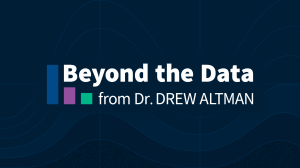Medicare Beneficiaries Are Not Luddites
The conventional wisdom used to be that seniors would be slow to adopt new digital health technologies. Many seniors were not online. Or many struggled with various cognitive issues. Or they’re not tech savvy. Or they’re suspicious of apps and AI. I wondered how much things had changed when CMS announced the new initiative to “make health tech great again.”
A lot has changed, according to results from the first of KFF’s survey series of the public and seniors about their use of, and appetite for, digital health tech. Possibly COVID forced America’s seniors to get on a steep tech learning curve. Possibly their kids have educated them. Or maybe seniors have simply aged into tech or adapted to new technologies to survive, as they’ve had to do to deal with their cell phone company and streaming service—what choice do they have?
From this survey, we found that the vast majority of seniors are using digital health tools and are interested in making greater use of it to navigate the health care system and manage health care needs. We didn’t find a meaningful difference between “younger” and “older” seniors, although we couldn’t look at the very old with this survey sample. And most Medicare beneficiaries (81%) say it’s important for Medicare to make it easier for them to share information between their providers or make apps more available to manage chronic conditions (63%), which are goals of the CMS initiative.
About 8 in 10 Medicare beneficiaries ages 65 and older used a health care app or website in the last year, and a sizable majority said it made it easier to use the health system. Half of them use multiple apps (55%). And there was no difference in the share of those 65 years or older who used an app or website to help manage their care in the last year (77%) and 30–49-year-olds (76%).
There were, however, sizeable differences between higher and more moderate to lower income seniors in their use of digital health tech—maybe not surprising but important. These differences may reflect sources of care, internet access, and many other factors, but they also mean that there will be real disparities in the use of digital health tools unless concerted efforts are made to level the playing field. As I attend conferences on digital health tech and AI, I hear a lot about how these tools might transform research, or diagnosis, or reduce physician burnout, or create business opportunities. I hear very little discussion of how digital health tech may actually assist patients (credit to the CMS initiative for that, whether you think it will succeed or not), and virtually no discussion of the challenges of reaching lower income populations or of integrating new digital technologies into public programs to improve access and health (except recently to determine eligibility for Medicaid work requirements). Possibly I am attending the wrong conferences.
There were also some very big holes in seniors’ use of digital health tools. Relatively modest shares of older Medicare beneficiaries have used an app or website for a video visit in the past year (just 30%). That was surprising. Even fewer have used it to help manage a chronic condition (23%), a major goal of health tech proponents. These are areas to watch and, if you are pushing this stuff, to work on.
And some Medicare beneficiaries do face real barriers to using tech: 17% have cognitive or mental impairments.
To be fair, we didn’t ask Medicare beneficiaries if they still preferred “old school” human contact to apps like MyHealth. These days, you message a care team; they message you back. That’s how you “talk to your doctor.” Many younger adults prefer urgent care centers to what now passes for “meaningful” interaction with your care “team.”
Our survey also found some significant obstacles to more rapid and widespread adoption of digital health tech by seniors, and one is especially significant: AI looms large in plans to expand digital health tech, but only 31% of Medicare beneficiaries ages 65 and older trust AI “a great deal” (8%) or “a fair amount” (23%) to access medical records and provide personalized information and advice. Public trust in AI tools to make appointments or send messages or access medical records is generally low. And both the general public and seniors are worried about the privacy of health information controlled by government, tech companies, or insurance companies (hospitals fare better, but still half of the public overall are worried about the privacy of the health information they manage).
Digital health tech is not the solution to the more basic and most important problems facing the health system. One of my tasks when I was a kid in Boston was to shovel the snow from the driveway so my dad, an internist at what is now BI/Deaconess, could make house calls in the middle of the night. Today, many people can’t find primary care providers at all or get appointments with them. House calls, of course, are long forgotten. Many can’t afford medical care or pay their medical bills, especially people who need a lot of care because they have a chronic illness or a major disease. But apps and other kinds of tech can play a role in making a fragmented and almost hopelessly complex system more navigable for patients. Apparently, as our survey findings suggest, a lot of Medicare beneficiaries—but not all beneficiaries equally—are ready for more digital health tech, and, as I said earlier, have become tech savvy to survive.

